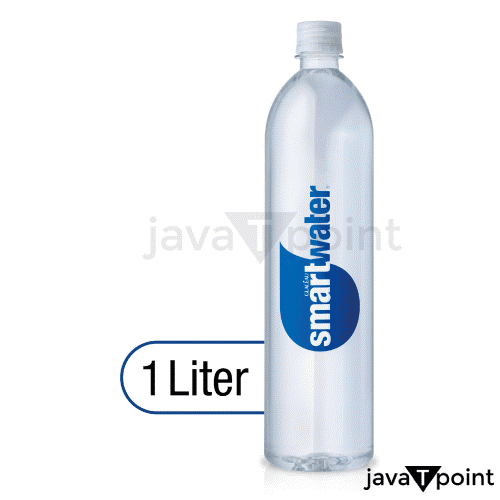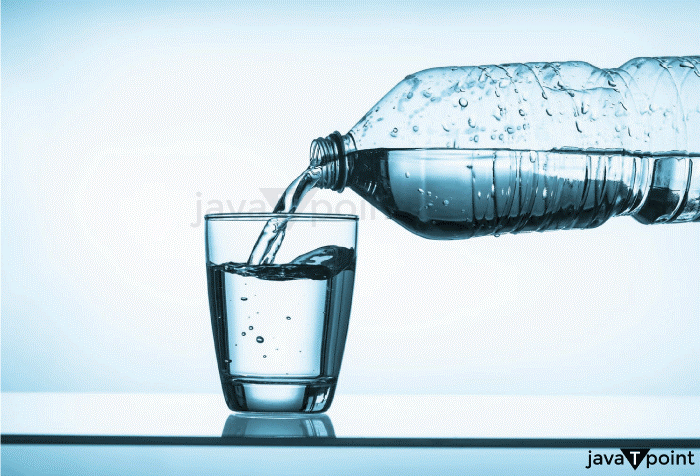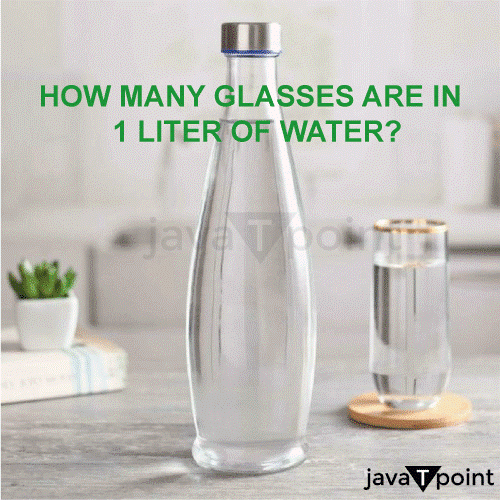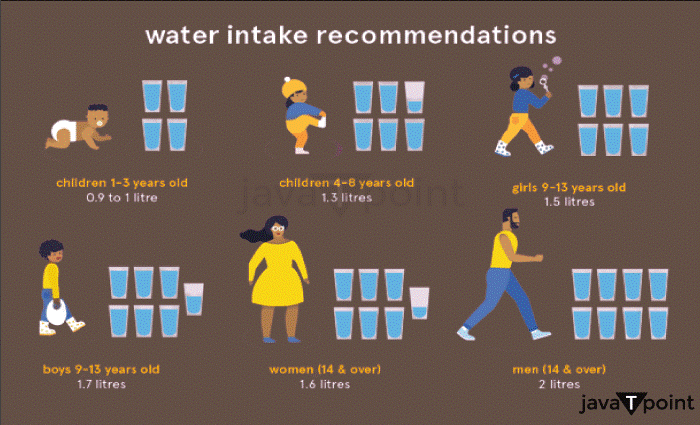One Liter is Equal to How Many Glasses of Water
Water is necessary for life's existence, and its intake is critical for our health and well-being. Different units of measurement, such as liters and glasses, are routinely used to assess water intake. This post will examine the conversion between one liter of water and the number of glasses it equals.
Liter
A liter is a metric unit of volume that is widely used around the world. It is equivalent to 1,000 milliliters (33.8 fluid ounces). Because of its practicality and precision, this unit of measurement is frequently used in scientific, medical, and daily contexts.

Glass
The word "glass" is less standardized, with volume varying according to cultural, geographical, and individual considerations. In the context of this article, a glass of water is an average-sized drinking glass that holds around 250 milliliters or 8.45 fluid ounces. Many nations, including India, utilize this estimation.

Factors of Conversion
- Basic Conversion: A conversion factor must be established to estimate the number of glasses of water corresponding to one liter. We can estimate the number of glasses of water in one liter by dividing the volume of one liter (1,000 milliliters) by the average volume of glass (250 milliliters).
- Glass Size Adjustments: It should be noted that glass sizes might vary greatly. While the abovementioned conversion is based on the assumption of an average-sized glass, variances can occur due to personal preferences or cultural standards. Smaller glasses can carry around 200 milliliters, whereas bigger glasses can hold up to 300 milliliters. As a result, depending on the glass size, the number of glasses corresponding to one liter may range between 3 and 5.

Hydration Recommendations
Understanding the equivalency between liters and glasses of water enables us to understand daily hydration recommendations better. Health organizations and experts frequently encourage consumers to consume a particular quantity of water daily to maintain optimal hydration levels.
- General Recommendations: The recommended daily water intake varies based on age, gender, climate, physical activity, and general health. Drinking 2-3 liters (8-12 cups) of water daily is a standard recommendation. Using our conversion factor, this equates to 8-12 glasses of water each day.
- Considerations and Adjustments: While these guidelines give a generic framework, individual circumstances must be considered and water consumption adjusted accordingly. Physical activity, living in hot regions, and certain medical problems may necessitate greater water intake. Similarly, age, body weight, and overall health should be considered while evaluating personal water needs.
Additional Elements Affecting Water Intake
- Alternative Beverages and Meals: While drinking water is the most obvious way to stay hydrated, it's important to remember that other drinks and meals can help us consume more water overall. Our daily hydration requirements can be met by fruit juices, herbal teas, milk, fruits, and vegetables with a high water content.
- Seasonal and Environmental Factors: Water consumption may change depending on the time of year and the surrounding environment. The body tends to lose more water via perspiration in the summer or dry areas, necessitating greater hydration. Similar to how physical activity and living at higher elevations may affect water needs, so can.

The Significance of Adequate Hydration
Proper hydration is essential for a variety of physiological functions as well as general health. Water is essential for maintaining body temperature, carrying nutrients, aiding digestion, lubricating joints, and eliminating waste. Dehydration brought on by a lack of water consumption can affect several biological processes and induce weariness, headaches, and poor cognitive function.
- Physical Performance and Endurance: Individuals participating in physical activity or sports should drink enough water. Physical performance can be considerably hampered when the body is dehydrated. Water helps to preserve flexibility and lowers the chance of injury by acting as a lubricant for joints and muscles. Additionally, maintaining hydration during exercise enhances cardiovascular health and lowers body temperature, enhancing performance.
- Mental Health and Cognitive Function: The amount of water consumed directly affects mental and cognitive wellness. Ample water is essential for the brain's optimal performance. Dehydration can cause symptoms including difficulty concentrating, a loss of attention, and memory loss. Additionally, research has shown that even slight dehydration can impact mood and heighten tiredness and anxiety symptoms. People can maintain their emotional stability and mental clarity by drinking enough water.
- Exercise and Physical Performance: People who are physically active and exercising need to stay hydrated. The body loses water through sweat while it is physically active, and replacing this water is necessary to sustain performance, avoid muscular cramps, and maintain body temperature. Proper hydration helps the heart, lubricates the joints, and improves physical stamina and endurance.
- Digestive Health and Weight Management: Optimal digestive health requires enough fluids. Water maintains digestive regularity, aids in the breakdown and absorption of nutrients, and reduces constipation. Additionally, maintaining hydration can help with weight control since it helps encourage a sensation of fullness and speed up metabolism, which can help decrease overeating.
- Impact on Skin Health: Proper hydration is important in keeping good skin. Water hydrates skin cells, promotes suppleness, and promotes a youthful look. Inadequate hydration can cause dry skin, flakiness, and increased susceptibility to skin problems like eczema and acne. Individuals may contribute to their skin's general health and vibrancy by maintaining proper water consumption.
Monitoring and Promoting Hydration:
- Tracking Water Intake: Monitoring water intake can assist people in making sure they are achieving their hydration goal. Monitoring water consumption may be done in several ways, such as using smartphone apps, special water bottles with volume sensors, or even maintaining a journal or record.
- Developing Healthy Behaviors: Promoting appropriate hydration requires the development of healthy behaviors. Maintaining appropriate hydration throughout the day may be achieved by carrying a reusable water bottle, posting reminders in visible places, and including foods high in water in meals. Additionally, making regular water consumption a habit can guarantee a steady intake.
Individual Variations
Individual hydration requirements might differ depending on age, sex, body weight, exercise level, environment, and general health. Due to increased physical activity or certain medical problems, some people may need extra water. Individualized suggestions for hydration can be obtained by consulting with healthcare specialists.
Regional and Cultural Differences
Although the conversion factor of around four glasses per liter is a helpful guideline, it is crucial to recognize that cultural and geographical variations affect how a typical glass size is perceived. The average size of glasses addressed in this article may be lower or greater in certain nations. People should thus be aware of their cultural context and adjust the conversion factor as necessary.
Practical Hydration Tips
- Always Carry a Water Bottle: Carrying a reusable water bottle with you is one of the simplest and most efficient methods to remain hydrated throughout the day. Water on hand encourages frequent sips and allows you to track your water consumption. Choose a bottle with volume indications to make measuring your consumption easier.
- Set Reminders: It's easy to forget to drink water in our hectic life. Set reminders on your phone or use hydration-tracking apps to receive notifications when it's time to drink. This basic method helps you in developing a consistent hydration practice.
Conclusion
Understanding the liter-to-glass conversion gives a practical approach to measuring and managing water intake. While the overall conversion factor of around four glasses per liter is a useful guideline, specific glass sizes must be considered and adjusted accordingly. Water is essential for general health, cognitive function, physical performance, and digestion. Individuals may keep appropriately hydrated throughout the day by following daily water intake requirements, tracking consumption, and using practical hydration techniques.
Remember that hydration requirements might vary depending on age, gender, activity intensity, and environment. Listen to your body's cues and check with a healthcare expert for personalized hydration advice. Prioritizing hydration is a simple yet effective method to promote your health and well-being. It is suggested to follow daily water consumption recommendations for adults, ranging from 2 to 3 liters (or 8 to 12 glasses) daily. Water consumption may be tracked using various techniques, such as water monitoring applications, notebooks, or labeled water bottles.
|




 For Videos Join Our Youtube Channel: Join Now
For Videos Join Our Youtube Channel: Join Now










